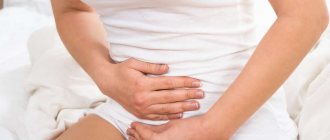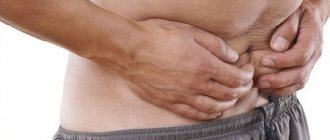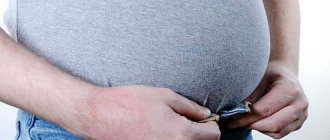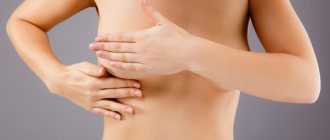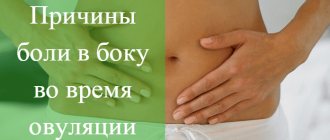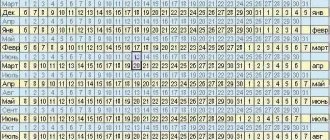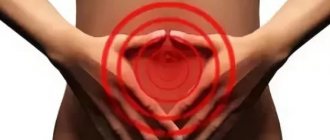Dysmenorrhea
There are 4 degrees of dysmenorrhea, differing in the intensity of pain.
0 degree. Abdominal pain is mild, painkillers are not required.
1st degree. The pain is moderate and quite tolerable. Natural accompanying symptoms are mild depression, headache, and indigestion. The malaise can be completely eliminated by taking a painkiller.
2nd degree. Pain during menstruation is severe, accompanied by symptoms such as nausea, dizziness, chills, general weakness, migraine, irritability. The duration of illness increases. Painkillers and sedatives help make you feel better.
3rd degree. Severe abdominal pain appears in a woman 2-3 days before the start of menstruation and continues until its end. At the same time, the temperature rises, the head hurts very much (to the point of vomiting), tachycardia and pain in the heart occur. Fainting may occur. The woman is completely incapacitated. It is not possible to improve the condition using conventional means.
Addition: Pain during menstruation can vary in nature (cramping, pulling, aching, stabbing), radiating to the lower back and hips.
To eliminate pathological pain during menstruation, the doctor prescribes non-steroidal anti-inflammatory drugs along with antispasmodics. They are able to suppress the production of prostaglandins, thereby reducing uterine contractility.
To treat dysmenorrhea, oral contraceptives are widely used - low-dose hormonal drugs that prevent the formation of excess prostaglandins. Herbal preparations based on phytoestrogens are also used, which help improve hormonal levels, as well as homeopathic remedies with non-hormonal action (menalgin). Gradually accumulating in the body, they help regulate the menstrual cycle, reduce pain and improve the condition of the nervous system.
Complex preparations containing vitamins, calcium, iron, magnesium, as well as plant extracts (for example, time factor) are prescribed. It is recommended to start taking medications in advance, before the start of your period. Then, by the time they occur, the required dose has accumulated in the body, and the drug acts more effectively.
Physiotherapy methods - UHF and electrophoresis - help reduce pain during menstruation. In this case, the procedure is carried out in advance. Before the onset of menstruation, special solutions (novocaine, sodium bromide) are applied to the stomach and exposure to ultrasound or electrical impulses is performed. Warming and pain relief occurs.
Dysmenorrhea in medicine refers to menstrual cramps in the lower abdomen before and during menstruation. They are caused by contractions of the uterus and the process of removing excess endometrial particles with blood. Pain syndrome can be triggered by the individual number of sensory receptors and a low pain threshold. Due to dysmenorrhea, 8–10 days before the start of menstruation, the lower abdomen hurts and pulls.
Symptoms can begin during puberty and accompany the woman until the onset of menopause. For many, with age or after the birth of a child, the pain syndrome becomes less noticeable.
Effective painkillers
Pain in the lower abdomen can be eliminated using special massage techniques, physiotherapeutic procedures, warm baths and local application of heat. But modern painkillers will be more effective.
Medications
The list of the most popular and effective medications that can cope with painful sensations during menstruation includes:
- Paracetamol;
- Aspirin;
- Piroxicam;
- Ibuprofen;
- Ketoprofen;
- Naproxen.
In addition to painkillers, antispasmodics are widely used, which relax smooth muscles and reduce pain intensity:
- Drotaverine;
- Papaverine;
- Buscopan;
- No-shpa.
Folk remedies
Without the help of painkillers, in the presence of intense or mild pain, you can alleviate the condition using proven folk remedies:
- chamomile strengthens the immune system and has a slight sedative effect, and the essential oil of the plant is considered a natural analgesic;
- raspberries regulate the cycle, relieve pain;
- lemon balm also has a mild sedative effect and is prescribed for insomnia, anxiety, and irritability;
- elecampane root stabilizes hormonal levels and eliminates painful discomfort during algomenorrhea;
- Horsetail has an anti-inflammatory, mild diuretic and strengthening effect, and is used in the presence of severe pain during menstrual periods.
Long-term unpleasant sensations that recur monthly with each menstruation, the appearance of discharge between menstruation, cycle disruption, increasing pain or bleeding are symptoms that require immediate consultation with a doctor.
Many women are concerned about the answer to the question of what to do if their stomach hurts before menstruation. In addition to general recommendations, there are a number of medications that help cope with pain. For nagging pain in the lower abdomen before menstruation, the following medications are used:
- Analgin.
- Ibuprofen.
- Ketorol.
Be sure to consult your gynecologist before starting to use these products. Read the instructions for use carefully and monitor the dosage of the medicine.
Causes of nagging pain
Representatives of the fairer sex should know everything about their body, for example, how many days before menstruation does the lower abdomen begin to hurt. A woman’s desire to be beautiful and to please men is ineradicable. But few know that the secrets of true beauty are simple and few in number.
The first rule of charm is a good mood, which is very difficult when the lower abdomen hurts a week before your period, and then it still hurts during the immediate critical days. The main thing is to think only about the good and don’t forget to smile friendly. Even if it’s your own reflection.
A good sleep means feeling great throughout the day, and, of course, the secret of beauty.
A mature egg is released from the ovary (this process is known as ovulation) and moves to the uterus. At the same time, thickening and loosening of the endometrium occurs - the soft spongy tissue lining the uterus from the inside.
If the egg is fertilized, it implants into the endometrium prepared for it and begins to develop into the fetus.
Often pain before menstruation is a normal natural condition and there is no reason to worry
Girls often view menstruation as a punishment that cannot be avoided. After all, even during the youth of our mothers and grandmothers, the arrival of menstruation was truly an event. They were forced to use bulky devices made of cotton wool and gauze and cut their hair from time to time in case something bad happened.
During such a cycle, they did not wear the best outfits, did not attend dances, and generally preferred to stay at home. This is easily explained: in those days there was no such wonderful tool as a tampon, which allows you to safely introduce your usual way of life. They are small in size, so they are always convenient to carry with you.
They protect against leakage, guarantee comfort and are almost imperceptible when inserted correctly.
For some girls, the first attempts to insert a tampon can cause some difficulties, although in fact it is not at all difficult. You just need to clearly imagine how a tampon works, how it works, as well as the structure of your body.
You need to know that there are tampons with applicators.
A smooth applicator allows you to conveniently and hygienically insert a tampon, as well as correctly position it inside, that is, it allows, firstly, not to touch the tampon with your hands, and secondly, to insert it in such a way that it will practically not be felt inside the body.
In general, as practice shows, the use of tampons is a relevant topic, because they allow us, if not to completely ignore some not very pleasant manifestations of female physiology, then at least to minimize the inconvenience associated with them.
And lead an active lifestyle any day of the month. Do the things you love, dance, play light sports, since during menstruation you should not overload the body.
With the correct implementation of all the rules, the mood will be wonderful, just like on an ordinary day.
There are often situations in which the lower abdomen feels tight a week before menstruation; the reasons for this condition can be very diverse. First of all, you should determine the nature of the pain.
If the pain is unbearable and is also present in every menstrual cycle, then you do not need to rely on painkillers, but simply go to a medical facility for diagnosis.
As a rule, the cause of pain is contractions of the muscle tissue of the uterus, they cause spasms in the lower abdomen.
There are pain receptors around the genital organs; each woman has them individually and function in different modes, so the reaction to contraction is different.
Therefore, if there are still 10 days until your period, but the lower abdomen is tight, then there is no reason to worry, although it is worth visiting a gynecologist.
In some cases, the reasons for stomach pain a week before menstruation may be a hormonal imbalance, resulting in an increase in estrogen levels, which causes heavy and prolonged bleeding.
Problems with hormonal levels between prostaglandins and sex hormones also lead to pain.
Prostaglandins play an important role in the occurrence of unpleasant sensations during menstruation; the greater their number, the more the uterus contracts, which causes severe pain.
There are situations when the lower abdomen pulls not 5 days before menstruation, but 7-10 days. There are various reasons that lead to the occurrence of such manifestations, the most common of them include:
- Premenstrual syndrome. This cause of pain, PMS, is one of the most common. This process is accompanied, in addition to pain, discomfort in the intestines, bloating, aggressiveness, a high degree of excitability, and there may also be increased fatigue, symptoms of lack of strength and apathy.
- Decreased progesterone production. Signs of this disorder are the occurrence of sensations in which, 10 days before menstruation, the stomach and lower back pull.
- Decreased endorphins. It is characterized by an unbalanced psycho-emotional state, irritability, swelling of the mammary glands, or problems with the digestive system.
- The occurrence of an inflammatory process. The results of the development of infectious diseases or hypothermia are acute pain and the occurrence of spasms.
- Processes that are associated with the appearance of ovulation.
A week before your period, the lower abdomen and lower back feel tight due to possible changes in the reproductive system. Just during this period, a follicle is formed in one of the ovaries, in which an egg is present.
About a week before the critical days, it reaches the desired size; when the egg matures and is ready for fertilization, it will certainly leave the follicle, its walls will first rupture. This moment may be accompanied by unpleasant sensations in the abdominal area.
We managed to find out how many days before menstruation the stomach hurts; in most cases this is a normal occurrence in a woman’s life.
If the pain occurs regularly, is unbearable and is accompanied by specific discharge, then you should contact a medical facility immediately, since there is a risk of an inflammatory process.
The period of menstruation is an important process in the life of every woman; it has a large number of features and nuances. First of all, you need to understand that it is necessary to regularly visit a gynecologist in order to detect the occurrence of a pathological process in time. This is especially true for those who experience various discomforts not only during menstrual periods, but also long before they begin.
Pulling lower in the abdomen as during menstruation - this condition is not alien to almost any girl or woman.
When a painful feeling appears on menstruation, this is quite normal, since the release of the inner layer of the uterus is associated with active contractions of its body.
This is the essence of the pain syndrome. But if a tugging feeling occurs both during menstruation and in the middle of the cycle, then this already becomes a dangerous circumstance.
The reasons for such symptoms can be very diverse - from PMS to gynecological abnormalities and pregnancy.
The female body is built slightly differently compared to the male body. Often women are subject to such difficulties as: disruptions of the menstrual cycle, complications during pregnancy. This is not typical for men.
A painful feeling is not a pathology, but its manifestation.
A painful sensation is always an unambiguous sign. Some representatives of the fairer sex endure this pain, while others simply cannot. If there is a pulling feeling in the lower abdomen, it is necessary to determine the main cause.
For these purposes, it is necessary to collect all descriptions of the patient’s pain syndrome and establish a preliminary diagnosis:
- The main thing that a gynecologist must do is to establish the nature of the discomfort. It can be mild, moderate or strong. He can torment the patient constantly or systematically.
- Of fundamental importance is such a point as dependence on the menstrual cycle. A painful, nagging feeling can occur several days before, during, or after menstruation. Pain is often felt during ovulation.
- It is important to determine the connection between pain and the process of urination, bowel movements, and eating. Pain may occur at rest or during walking and active movements.
- By location, discomfort is identified in the left or right area below the abdomen, blurred, bilateral. Not many people realize exactly why the lower abdomen feels tight. These etiological reasons can be hypothetically divided into pathological and, of course, physiological.
The lower abdomen hurts with diseases such as:
- Frequent urination;
- Salpingo-oophoritis in the chronicle;
- Endometritis;
- Excessive growth of the inner layer of the uterus;
- Infectious pathologies;
- Deviations in the formation of the genital organs;
- Pyelonephritis;
- Intestinal diseases;
- Diverticulitis.
Natural physiological factors include stress, pregnancy, premenstrual time, freezing, changes in sexual life, and the timing of ovulation.
It is no secret that during any menstrual cycle, an egg matures, leaves the place of maturation and moves to the location of the uterus, fully prone to fertilization, and then is rejected with a certain amount of blood if conception does not take place.
In medical practice, this natural phenomenon is called ovulation, the process of opening of the follicle and release of the egg, which actually becomes a microtrauma for the woman’s body, and according to physiological principles can be associated with painful manifestations.
A pulling feeling, which manifests itself more strongly on one side and then on the other, is often interpreted as the rapid maturation of the egg in one of the ovaries.
In what cases is it necessary to consult a doctor?
Why does the lower abdomen hurt one or two weeks before the start of menstruation? Doctors give different answers. Often the problem can be solved by adjusting your diet and lifestyle. It will be more difficult to treat the disorder if it is accompanied by the following symptoms:
- The appearance of pathological discharge with an unpleasant smell of rotten herring. Such discharge is a sign of infection.
- Increased body temperature. Fever indicates the presence of serious inflammation.
- Heavy, prolonged menstruation. If earlier your periods lasted 4-5 days, but after the pain appeared below they began to last 7-8 days, it is possible that fibroids or endometriosis have developed in the uterus. Such symptoms are also characteristic of cervical erosion.
- Lack of menstruation. In a situation where the stomach began to ache before the expected period, but the critical days did not appear, it is likely that a pregnancy has occurred, which is under threat.
- Bloody discharge in the middle of the cycle. This happens with various disorders of the genitourinary system.
Premenstrual syndrome
Cyclic syndrome is a whole complex of disorders on the part of the endocrine, psycho-emotional and vegetative-vascular systems. The main cause of PMS is considered to be hormonal disorders in women at risk and exposed to the following factors:
- overwork at work;
- constant stress;
- tendency to depression;
- injuries and surgical interventions;
- inflammatory diseases of the genital organs;
- lack of physical activity;
- lack of balanced nutrition.
It’s no wonder that more than 55% of women are familiar with the abbreviation PMS firsthand.
There is no exact figure for how many days before menstruation the lower abdomen begins to pull. The norm varies from 2 to 14 days. In addition to aching pain in the lower abdomen, signs such as migraines radiating to the eyeballs, stomach upsets, painful sensitivity of the mammary glands, weakness, irritability, excessive vulnerability, and apathy are also observed. Characterized by a sharp change in mood - from excited-elated to tearful-depressive.
Malaise may include symptoms of cardiovascular diseases: rapid heartbeat, numbness of the hands, sweating, shortness of breath.
This condition usually goes away with the onset of menstruation, but sometimes lasts for several days after it ends.
Premenstrual syndrome is a combination of several symptoms that occur in a number of representatives of the fairer sex shortly before the onset of menstruation. The pathogenesis of this condition is not well understood; there are theories of the psychosomatic and autoimmune origin of PMS. Its symptoms include:
- nagging pain in the lower abdomen;
- menstrual migraine;
- mild nausea;
- intolerance to certain foods;
- pain in the mammary glands;
- hypersweating.
So, PMS is one of the reasons why the lower abdomen feels tight before menstruation, and also why the stomach begins to hurt.
In a woman’s body, not only emotional, but also physiological disruptions occur, accompanied by very unpleasant manifestations. Many begin to experience chest and stomach pain, while others suffer from morning sickness. However, emotional symptoms are often even more significant.
If often before menstruation the lower abdomen begins to pull or the groin area ache, then you should consult a doctor to rule out pathologies of the endocrine system and a tumor process in the pituitary gland.
Physiological causes of painful periods
Many women experience lower abdominal pain a few days before their period, and in most cases this is due to physiological reasons:
- Premenstrual syndrome. It occurs due to changes in the balance of hormones and the body's preparation for menstruation. This manifests itself in changes in the endometrium and mucous membrane, which can cause discomfort.
- Dysmenorrhea. A condition in which pain appears 2 days before and during the next 2 days after the start of the critical period.
Severe PMS can be recognized by the following signs: irritability, tearfulness, fatigue. The pain in this case will not be too intense, nagging. Some women experience headaches and gastrointestinal disturbances (diarrhea, bloating, constipation).
Another reason is algomenorrhea, which is considered an individual characteristic of the body. This condition is classified as gynecological pathology. With algomenorrhea, pain appears 7-8 days before menstruation, which goes away only 7 days after the start of CD.
This condition can also develop with an intrauterine device, inflammatory processes and after operations. Algomenorrhea often becomes one of the symptoms of inflammation of the uterus and appendages.
Ovulation and hormones
Physiological causes of pain before menstruation include a chronic decrease in the level of endorphins in the body. Then the pain manifests itself not only in the stomach, but also in the chest.
Ovulation can be an independent cause of pain, but sometimes it becomes a factor in reducing endorphin levels. It occurs 10-15 days before menstruation. The pain is localized on one side, which is directly related to the characteristics of the release of the egg from the left or right ovary.
Hormonal contraceptives
If 4-5 days before your period your lower abdomen feels very tight, the cause may be a hormonal imbalance:
- Estrogen balance is extremely important for the proper functioning of the reproductive system. Its excess, as well as its deficiency, can cause discomfort and bloating, as well as menstrual irregularities. Signs that indicate unhealthy levels of estrogen in the body include flaking and dry skin, dullness and hair loss, migraines, insomnia, unstable blood pressure, chest pain and bad mood.
- The level of progesterone before menstruation should be quite high, and its increase begins approximately on the 15th day of the cycle, when the egg leaves the follicle. Hormone deficiency provokes spasms and contractions of the uterine body, which lead to aching pain in the lower abdomen and lower back before menstruation. An imbalance is indicated by swelling and pain of the mammary glands, heavy discharge during menstruation, bleeding during the intermenstrual period, and swelling of the face.
- The culprit of abdominal discomfort may be a low level of “happiness hormones”. Endorphins are designed to alleviate pain and stress for the body. However, with their deficiency, when the lower abdomen hurts and pulls before menstruation, it is felt more strongly than usual. Depressive states, apathy, sensitivity of the breasts and vaginal walls during sex, and gastrointestinal disorders are also observed.
- Prostaglandins are hormone-like substances that monitor and regulate biochemical processes in the body. They are the ones who send signals to the brain about unpleasant sensations during menstruation. Due to hormonal imbalances, the amount of prostaglandins may increase, and with them sensitivity to pain.
The appearance of abdominal discomfort before menstruation may be associated with taking OCs. The drugs greatly affect the ratio of hormones and the characteristics of the menstrual cycle.
Abdominal pain may indicate a side effect of the contraceptive and its incompatibility with the body.
And also, the symptom is observed after a sharp cessation of taking OCs, due to a strong hormonal surge.
If you explain to your doctor that your lower abdomen hurts, like during your period, then most likely he will make the assumption that this is due to hormonal levels.
Once a woman reaches her thirties, her estrogen levels often increase, causing her periods to be long and painful.
The presence of PMS also indicates an imbalance of hormones, in particular progesterone and prostaglandins. The latter are the substances that provide you with discomfort during menstruation, as they stimulate uterine contractions. The higher their level, the stronger the pain.
Natural causes of pain before menstruation
Pain is considered a natural reaction of the body to the “conflict” of hormones - estrogen and progesterone, since their concentrations jump sharply before the start of the menstrual cycle.
During ovulation, when the egg attaches and detaches (if fertilization does not occur) from the wall of the fallopian tube, the mucous membrane is injured, so some discomfort is normal.
How many days can the discomfort last? Usually no more than 2-3. If the general physical and mental state does not noticeably change, then there is no reason to panic and treatment is not required.
Ovulation
Since it can be difficult to determine how many days before your period a stomach ache begins, this phenomenon may affect the period of ovulation. Depending on the characteristics of a woman’s body, it can occur between days 7 and 19 of the cycle. This gap is explained by the influence of external factors on the body - stress, overwork, health conditions and others.
Minor nagging pain in the lower abdomen is a common sign of ovulation and, due to an irregular cycle, can be bothersome about a week before your period. Discomfort may be accompanied by slight bleeding, a slightly exalted state, increased libido, increased taste buds and sense of smell.
Stomach hurts before menstruation, but menstruation has not occurred
The most likely cause of pain during this period in the absence of further menstruation is pregnancy. To diagnose pregnancy, you can use home tests in the form of strips with a reagent applied to them or laboratory methods (determining the level of hCG in the blood and urine). A doctor can diagnose pregnancy using a transvaginal ultrasound, but you should know that this method is quite traumatic and in the early stages can cause termination of pregnancy.
Pain in the lower abdomen before menstruation is a fairly common problem that almost all women face. In most cases, pain syndrome is the result of physiological processes that occur in the body during the menstrual cycle, but sometimes serious illnesses can cause similar symptoms, so if you have regular pain during this period, you should not postpone a visit to the gynecologist. Read the incubation period for conjunctivitis on our website.
Non-gynecological reasons
With a normal balance of hormones, women do not feel discomfort during any period of the menstrual cycle. When a woman experiences a painful feeling similar to that which accompanies menstruation below the abdomen and back, the cause is prostaglandins.
This hormone, when produced by the body in excessive quantities, affects the contraction of the uterine muscles, causing a feeling of pain. With such a malfunction of the functionality of the female body, nagging painful sensations often occur after the end of menstruation.
Such a hormonal imbalance is provoked by an increase in the activity of the thyroid gland. As usual, other symptoms are added, more precisely, sleep disturbances, weight gain or loss, and so on.
In addition, the use of hormone-modulating drugs can affect the ratio of hormones. In such a situation, you should contact a gynecologist with a description of the symptoms that have arisen.
Appendicitis
The inflammatory process in the appendix can also be characterized by nagging painful sensations in the lower abdomen, similar to the start of menstruation.
This manifestation is the result of a shift in the location of the painful feeling.
Pain on the right side may not only be due to difficulties in the reproductive sphere.
The period of menstrual discharge is characterized by a decrease in immunity, a large number of symptoms that change the activity of other organs, more precisely the gastrointestinal tract. And for this reason, all the signs may indicate the following diseases: Appendicitis.
https://www.youtube.com/watch?v=GYRUPwsafbg
The result of this may be an inflammatory process in the appendix. A sharp painful sensation appears first in the middle of the abdomen, after which it spreads to the right side.
Other signs:
- vomiting just once
- diarrhea,
- feverish increase in temperature.
The painful feeling subsides when lying on the right side.
A painful sensation in the lower abdomen can also occur after sex.
There is no need to worry about this phenomenon; it is considered normal.
Each sexual intercourse is, although insignificant, an injury to the mucous membrane of the vagina, and in some situations, in particular after violent sexual intercourse, these injuries appear much more pronounced than always.
There is an aching, nagging painful sensation, possibly even the appearance of brown spotting, which occurs if there is a violation of the integrity of the mucous membrane (this is thickened blood).
There is no need to worry about pain of this nature - and alternatively, be a little more careful in your sex life.
Thus, for the most part, circumstances when a female representative has a tightening in the lower abdomen require consultation with a doctor, and perhaps subsequent treatment measures. If the painful feeling does not recede but, on the contrary, worsens, then you must immediately go to the gynecologist.
What to do if you have bloating?
What to do to overcome this unpleasant phenomenon? You can’t get rid of it completely, but you can reduce the size and period of bloating. To do this, you need to follow a healthy lifestyle and doctors' recommendations.
Playing sports
Constantly engage in available sports: water aerobics, swimming, dancing, exercise equipment, running. During menstruation, heavy exertion is not recommended; it is better to walk long distances. While walking, gases are removed from the intestines and gastrointestinal tract much faster. Lie down only if you feel unwell. Pump up your abs, do exercises to strengthen your back muscles.
Proper nutrition
Proper nutrition is one of the main ways to combat bloating. Before menstruation, it is advisable to reduce food portions and increase the number of meals. Limit or completely avoid junk food and products that cause flatulence.
- Eat less salt. During PMS, as during pregnancy, you crave salty foods. Sodium retains water in the body, increases the load on the heart and hematopoietic system, and increases swelling.
- Limit your sugar intake. All sweets in the body are processed into glucose, which retains sodium in the body.
- Drink water. It improves digestion, helps fight constipation, and removes toxins from the body.
- Avoid tea, coffee, alcohol and carbonated drinks. They contribute to bloating.
- Drink herbal teas from mint and decoctions of chamomile, lingonberries, and cranberries. They reduce pain and remove excess fluid from the body.
- Eat foods rich in fiber. They help fight constipation.
- Keep it in moderation. When consuming large amounts, gas formation and bloating begin. A lot of fiber is found in cabbage, bran, beans, beans, and mushrooms.
- Temporarily exclude dairy products from your diet, which increase the manifestations of flatulence many times over.
- Take a complex preparation containing B vitamins, potassium, magnesium. They are responsible for digestion, strengthening blood vessels and calming the nerves.
Warm baths
Before your period starts, take warm, soothing baths. You can add sea salt, a few drops of fennel or black pepper essential oil, and a decoction of valerian, pine needles, mint, and sage herbs to the water. Baths help you relax, promote healthy sleep, and strengthen the nervous system.
Sex
Sex is good for the body. To improve your well-being and mood, doctors recommend having sex before your period. It helps blood circulation in the pelvic area and has a beneficial effect on the female body.
https://youtu.be/8AC3_TYA0Lk
Cloth
If your belly enlarges for natural reasons, you should not try to tighten it with a corset or shapewear. Strong compression causes severe pain due to impaired blood supply, increased swelling, intestinal spasms, and flatulence. It is better not to tighten your stomach, but to wear loose clothes.
Medicines
If the abdominal volume increases, take medications depending on the cause of the bloating:
- If the main symptom is tension, pain, spasms of the intestines and uterus, then antispasmodics help well: 1-2 tablets of No-shpa, Spasmalgon, Drotaverine.
- If your stomach is very swollen, use carminatives: Disflatil, Espumisan, Antareit.
- If you experience flatulence, bowel dysfunction, nausea, use enterosorbents: Smecta, Polyphepan, Activated carbon.
The medication should not be abused. It is better to consult a gynecologist.
Bloating occurs in 75% of women. This is a normal reaction of the body to hormonal changes during premenstrual syndrome and menstruation. If the symptoms of PMS do not go away, contact a specialist and conduct a comprehensive examination. After treatment of concomitant diseases, if preventive rules are followed, a slight increase in the waist will be noticeable only a couple of days at the beginning of menstruation.
Every woman is familiar with periodic pain in the lower abdomen. Appear before menstruation or during menstruation. Women often complain that their stomach hurts in the middle of their cycle. Nagging pain occurs for a number of reasons, the main one being the onset of ovulation.
Ovulation occurs every month. At this moment, the egg is released from the ovary. The period of egg maturation is considered a favorable moment for conceiving a child. A regular menstrual cycle depends on the timing and presence of ovulation.
Statistics show that most of the fair sex do not know when the egg is released. For a healthy woman, this is usually the middle of the cycle. During this period, basal body temperature rises. Minor pain in the lower abdomen and swelling of the mammary glands appear. To clarify the onset of ovulation, it is recommended to do a special test (sold at the pharmacy).
Pregnancy
Fertilization of the egg can make itself felt with very specific symptoms - a delay in menstruation and unbearable pain in the lower abdomen. In the second or third week of pregnancy, such symptoms can easily be confused with the upcoming critical days in the new month.
Causes for concern may be:
- three or four days before the expected menstruation, an elevated temperature is observed;
- acute painful sensations in the lower abdomen and back, radiating to the groin and pubis;
- spasmodic pulsating sensations;
- feeling of tension and pressure in the abdomen;
- any discomfort that appeared along with bloody or brown discharge on the 5th or 6th day of the delay;
- malaise is accompanied by nausea and vomiting;
- pain in the fifth week of pregnancy may warn of an ectopic pregnancy.
Why does my stomach hurt but I don’t have my period?
The stomach feels tight not only when your period is approaching, but also during pregnancy. If there is a delay, the breasts swell, you feel nauseous, it is likely that the egg has been fertilized and implanted in the uterus.
In this case, pain is not normal, so if you receive a positive test result, go to the antenatal clinic.
After conception, the uterus begins to stretch, which causes mild discomfort. During an ectopic pregnancy, mild pain is felt; if there is a threat of miscarriage, the pain becomes cramping in nature.
An STI or chronic inflammation can also prevent you from getting your period. The delay is accompanied by severe pain radiating to the lower back. They say that an inflammatory process is actively developing in the genitourinary tract. Treatment must be started as quickly as possible in order to stop the pathology at an early stage.
Prevention of pain during menstruation (menstruation) in a teenager
1 avoid prolonged exposure to cold and constant drafts;
2 ensure that your shoes do not get wet and your feet are always dry;
3 be regularly examined by a gynecologist;
4 contact specialists and assess hormonal parameters.
1 laboratory tests of smears, blood for ESR, cytology;
2 colcoscopic technique, which allows assessing the condition of the cervical epithelium, identifying the presence of erosive lesions or dysplasia;
3 results of a tissue biopsy of the genital organs, in which it is possible to detect the presence of atypical cells in them, indicating the possible development of an oncological process.
Menstrual pain caused by secondary dysmenorrhea is eliminated by treating the underlying diseases. The primary form of this menstrual disorder is somewhat more difficult to combat. But even here, competent actions by a doctor can significantly alleviate the condition of a young girl, for example, hormonal imbalance is corrected with correctly selected hormonal drugs. The regimen for taking tranquilizers and painkillers should be prescribed with a clear dosage that does not harm the general condition of the body.
Girls are not recommended to use vaginal suppositories on their own in case of pain during menstruation without consulting a doctor, so as not to disturb the vaginal biocenosis.
When there is a pull in the lower abdomen before the onset of menstruation, you must follow simple instructions to avoid this:
- Exercise before your period. Swim and stretch your lower back;
- Avoid overeating. Heavy weight provokes pain;
- Breathe deeply with clean air, take vitamins, avoid smoking and alcohol.
Severe, growing pain simply cannot be tolerated. At initial signs, it is better to consult a doctor.
How to avoid stomach pain
If your stomach constantly hurts before menstruation, then experts advise girls to follow several recommendations. They are:
- Do exercises regularly, visit the pool or do lower back massages.
- Watch your weight, as excess body weight often contributes to the appearance of pain.
- Reconsider your lifestyle, stop smoking and alcohol, spend more time in the fresh air and eat right.
- If your stomach hurts too much, don’t tolerate it – take a pill. If it does not help, then call an ambulance.
Many girls wonder why abdominal discomfort occurs before menstruation. As stated above, a large number of factors contribute to this phenomenon.
If the pathology is severely neglected, then there is a risk of developing dangerous complications that can pose a threat to the patient’s life.
Therefore, every woman should closely monitor her health and do not hesitate to consult a gynecologist on any issue that arises.
Only a doctor will help you figure out why your stomach hurts and give recommendations on how to cope with the problem and prevent its development in the future.
Benign neoplasms
Uterine fibroids are the cause of 50% of cases of reproductive system disease. This is a benign tumor that forms in the myometrium due to hormonal imbalance. The hormone estrogen fuels the growth of formation. Fibroids progress throughout the reproductive period, until menopause, when the body stops producing estrogen.
The risk of the disease increases in the case of processes that affect hormonal levels:
- inflammatory processes;
- endometriosis;
- endocrine diseases;
- gynecological operations and abortions;
- lack of regular sex life.
The symptoms of the disease are similar to many other gynecological pathologies, so the tumor can only be identified during an examination by a gynecologist. Reasons to suspect something is wrong may be: very strong nagging pain before menstruation, pressure on the bladder, heavier periods than usual, and as a result of heavy blood loss, pale skin, weakness.
Inflammatory processes
Feeling unwell 3 or 4 days before the onset of menstruation may indicate inflammatory processes in the reproductive organs. If usually the sensations were not too uncomfortable, then inflammation will greatly increase the pain.
The causative agent of pathogenic processes can be sexually transmitted infections and viruses. There is a high probability of them entering the body with the onset of cold weather. The body does not have time to adapt, which leads to a sharp decrease in immunity.
The appearance of inflammation is possible against the background of another disease of a viral or infectious nature. This is especially true for infection of the pelvic and abdominal organs.
The most common inflammatory diseases accompanied by pain in the lower abdomen:
- Adnexitis is inflammation of the ovaries and appendages. The following set of symptoms is typical for the pathology: fever, weakness, chills, nausea, vomiting, burning during urination, purulent discharge, tension in the abdominal cavity and abdominal pain with cramps before menstruation and in other phases of the cycle.
- Cervicitis is an inflammation of the cervix, infectious and non-infectious. The disease can be almost asymptomatic. In other cases, sipping sensations in the lower abdomen are characteristic, especially pronounced during sex. The disease can manifest itself as bleeding between menstruation, as well as purulent mucous discharge.
- Vulvitis is an external inflammation of the genital organs. Pain and tingling usually spreads to the lower abdomen, radiating to the pubic and genital area. A yellowish discharge appears with varying consistency and has an unpleasant odor. As symptoms worsen, the temperature may rise and fatigue may be felt.
- Endometritis is an acute inflammation of the surface layer of the endometrium. The chronic form of the disease develops as a result of infections in the area of the uterus and fallopian tubes, which can occur against the background of other gynecological diseases, complications after childbirth and surgical interventions. Inflammation can be provoked by urogenital infections - chlamydia, ureaplasma, mycoplasma and herpes virus. Occurs with acute symptoms: temperature above 38 degrees, abdominal pain, purulent discharge, migraines, bloating.
When to Seek Medical Help
If discomfort accompanied by discomfort in the lower abdomen seven days before menstruation bothers you regularly, you should consult a gynecologist.
It is also important to pay attention to the occurrence of the following symptoms:
- painful discomfort more than five days before menstruation accompanied by bleeding;
- discomfort occurs during or after sex;
- you notice changes in body temperature;
- feeling sick, feeling the urge to vomit;
- pain extends to the lower back, legs or genitals;
- the discharge has acquired a yellowish or purulent tint, and an unpleasant odor has appeared;
- the lower abdomen hurts and aches before menstruation in the postpartum period or after surgery.
If abdominal discomfort is accompanied by additional symptoms, it would be better to immediately undergo a medical diagnosis and do all the necessary tests.
Based on comments on women's forums, many women are accustomed to considering pain a few days before their period as part of the menstrual cycle. However, it is important to remember that an ailment that deprives you of the joy of life can be an alarm bell and warn of the presence of serious pathologies, especially if you are sick for the first time. Timely examination is the key to quickly solving the problem. Love yourself and don't let pain ruin your life.
Endometriosis
Endometriosis is the growth of endometrial tissue outside its natural layer in more than 8% of women during the reproductive period. The disease is hormonal in nature, but medical articles and studies have not yet given an exact answer about the causes of the pathology.
The disease is one of the main causes of abdominal pain, and it is often confused with normal menstrual discomfort.
At risk of pathology are:
- women with a menstrual cycle of less than 27 days and painful menstruation;
- those who have previously had cases of the disease in their family;
- girls who started their first periods early;
- nulliparous or late giving birth women.
For the vast majority of the menstrual cycle, endometriosis can develop almost asymptomatically. The signs intensify and make themselves felt when, a week before your period, an uncomfortable pulling sensation in the lower abdomen and lower back begins. There is pain during sexual intercourse, spotting in the last phases of the cycle, constipation, frequent urination, and a slight increase in temperature.
Ways to eliminate pain in the lower abdomen
Analgesics will help relieve acute spasms. You can take No-shpa, Ibuprofen, Spazmalgon, Papaverine. You should not choose anti-inflammatory drugs and antibiotics on your own. The disease can become chronic or lead to the development of severe complications. In addition, after taking the pills, the symptoms may be blurred, and it will be difficult for the doctor to make a correct diagnosis.
For severe pain associated with menstruation, it is recommended to lie down to relax the abdominal muscles. Tea with chamomile and lemon balm will help you calm down a little. You can briefly apply a cool heating pad to your stomach. These days you should change your diet, exclude fatty, fried, salty foods and try not to overeat. A crowded intestine puts additional pressure on the uterus and ovaries.
The stomach may hurt a week before your period for various reasons. This includes the gynecological sphere and the urinary, nervous, and digestive systems. To correctly determine the diagnosis, you need to visit a doctor and undergo an examination. Timely treatment begins reduces the risk of developing severe complications.
httpss://youtu.be/zBuIwlTq81Q?t=10s
